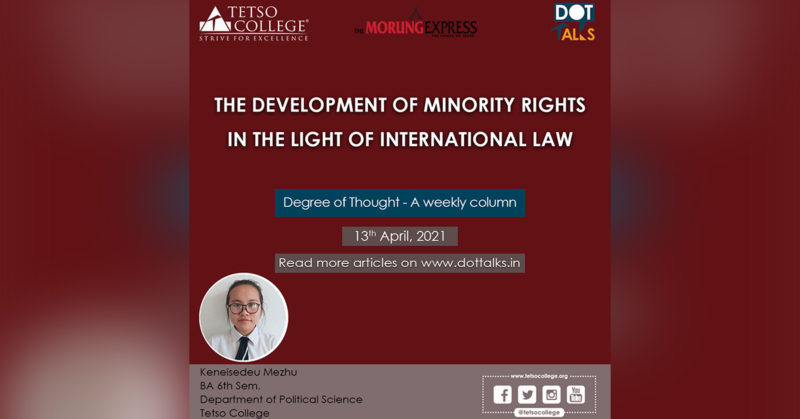 Who are minorities under international law? Adopted by consensus in 1992, the United Nations Minorities Declaration in its Article 1 refers to minorities as based on national or ethnic, cultural, religious and linguistic identity, and provides that States should protect their existence. How far have we succeeded in giving justice to the mandate of the United Nations Minorities Declaration? Keneisedeu Mezhu examines this question.
Who are minorities under international law? Adopted by consensus in 1992, the United Nations Minorities Declaration in its Article 1 refers to minorities as based on national or ethnic, cultural, religious and linguistic identity, and provides that States should protect their existence. How far have we succeeded in giving justice to the mandate of the United Nations Minorities Declaration? Keneisedeu Mezhu examines this question.
THE DEVELOPMENT OF MINORITY RIGHTS IN THE LIGHT OF INTERNATIONAL LAW
International law by definition is the system of law whose primary function is to regulate the relations of states with one another. International law has been advancing in its scope and approach. Lawyer Victoria first recognised that ‘the new law between states which are springing up are not confined to Europe or Christendom but belongs to the entire world’, has been a guiding light for inclusivity. Likewise, Lawyer Gentilis, the first writer to ‘disentangle international law from ethics and theology, and to treat it for what it is – a distinct branch of jurisprudence’ – has been a reminder of a legacy from the past, the acceptance of which was an essential condition of the enjoyment of sovereignty. International law now applies in many places and in many contexts directly to the individual. One such example is ‘minorities rights.’ Rights of Minority exist to strengthen spaces where minorities are loosely considered. Like any other legal claim, minority rights continue to widen its scope in addressing the issues of the time faced by the groups.
Who is considered Minority? Minority- a culturally, ethnically or racial distinct group that co-exists with dominant groups but is subordinate. Minority status does not necessarily correlate to population size. For example, South Africa under Apartheid shows that the so called minority groups may have a population double the size of the dominating group.
The broad history of the development of protection for minorities in International law is generally well known. Prior to the First World War, the protection of minorities existed in international law primarily based on bilateral treaties in response to particular conflicts or potential conflicts involving kin groups or co-religionists. Efforts to forcibly eliminate a minority from a society have ranged from expulsion to mob violence, ethnic cleansing and genocide. Post-War, the League of Nations witnessed important developments in the articulation of standards of minority protection: in addition to the inclusion of individual general human rights of particular importance to members of minority (such as the right to life, liberty and freedom of religion) and a richer understanding of nondiscrimination and equality rights, the various instruments which formed part of the system also included, for example: important guarantees relating to the use of minority languages in the education system and before the courts. The regime did not survive the cataclysms of the Second World War. Expansionism by Nazi Germany under the veil of ‘protecting’ kin-groups in other states – a complete exploitation of minority group led to universal articulation of human rights, supplemented by particular prohibitions on genocide and racial discrimination in the aftermath of Second World War. Ethnic cleansing and genocide in the former Yugoslavia, Rwanda, Sudan etc, provide tragic evidence of the forcible elimination of minorities.
During the last decades, several new instruments, monitoring and dialogue institutions and procedures have been added to the international minority regime. It now amounts to more than fifty instruments and some dozen monitoring and dialogue institutions with minority specific provisions. Members of minorities are entitled to the equal enjoyment of all human rights and equal access to all implementation and monitoring procedures designed for human rights in general. The United Nations Convention on the Prevention and Punishment of the Crime of Genocide (‘Genocide Convention’) of 1948 and the International Convention on the Elimination of all forms of Racial Discrimination (ICERD) of 1965, the International Covenant on Civil and Political Rights (‘ICCPR’) under Article 27, Human Rights Council etc, are some important institutions binding Minority rights. Some relevant international and regional human rights instruments that include minority rights are: the United Nations Declaration on the Rights of Persons Belonging to National or Ethnic, Religious and Linguistic Minorities (1992); the two Council of Europe treaties, the Framework Convention for the Protection of National Minorities (1995) and the European Charter for Regional or Minority Languages (1992) and; the Organization for Security and Co-operation in Europe’s (OSCE) Copenhagen Document (Art. 31-35) (1990).
Mechanisms such as the OSCE High Commissioner on National Minorities , the Office of the United Nations of the High Commissioner of Human Rights, the UN Independent Expert on Minority Issues and the UN Forum on Minority Issues (former Working Group on Minorities) – work to shed light on this issue. At national level , we see a significant number of states adopting legislation that addresses the protection of minority communities or established institutions with minority protection included in their mandates. For example, mandates in Indian Constitution such as Art 15 (1) & (2), Art 16 (1 & 2) , Art 25 (1), Art 28, and Art 30 (1 & 2) are for Minorities. Also, the National Commission for Minorities functions as a mechanism to help address issues faced by minority communities in the country.
Minority rights though widely acknowledged is only rudimentary and largely ineffective mechanisms for monitoring and enforcing compliance. In the present context, complete assimilation of minority/ies is rare; we are witnessing ‘acculturation’ in which two or more groups exchange cultural traits.
Therefore, the study of Minority rights in the light of International law invites us to revisit the treaties, and legislations adopted. Given that International law does not have a International jurisprudence, it becomes the duty of a state/nation to protect the minorities anywhere for societal stability.
Degree of Thought is a weekly community column initiated by Tetso College in partnership with The Morung Express. Degree of Thought will delve into the social, cultural, political and educational issues around us. The views expressed here do not reflect the opinion of the institution. Tetso College is a NAAC Accredited UGC recognised Commerce and Arts College. The editors are Dr Hewasa Lorin, Dr. Aniruddha Babar, Rinsit B Sareo, Meren Lemtur and Kvulo Lorin.
For feedback or comments please email: dot@tetsocollege.org

